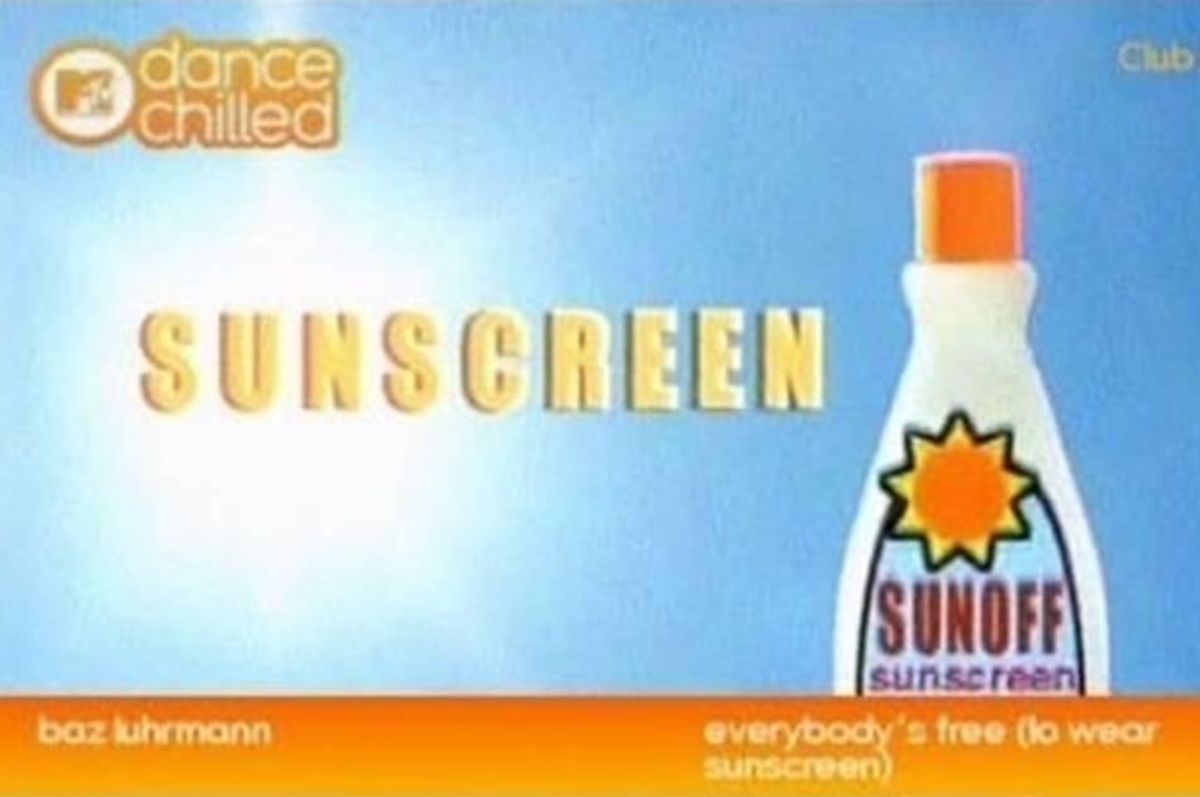The 'Sunscreen Song' is 25. Here’s why the advice from the Gen X anthem is still important.
Remember the moving graduation speech that became an unlikely hit?

The video for "Everybody's Free (to Wear Sunscreen)."
On June 1, 1997, the Chicago Tribune published columnist Mary Schmich's fantasy commencement speech entitled, "Advice, like youth, probably just wasted on the young." In the piece, she lamented that "Inside every adult lurks a graduation speaker dying to get out," but most of us, "will never be invited to sow our words of wisdom among an audience of caps and gowns."
Next came her attempt to share the knowledge she's learned with the graduating "Class of '97." In the column she shares one piece of advice she is sure about—“wear sunscreen”—and a litany of wisdom that she admits “has no basis more reliable than my own meandering experience.”
Among Schmich’s observations is that we should remain close to our siblings, appreciate our youth and never be reckless with other people’s hearts.
The title of her piece suggests it would never be embraced by her target audience. But in a strange twist of fate, it would become a pop culture phenomenon that in the late ’90s was an inescapable part of youth culture.
Soon after the column’s publication, Australian film director Baz Luhrmann was working alongside Anton Monsted and Josh Abrahams on a remix to the 1991 song “Everybody’s Free (To Feel Good)," by Rozalla. The song had appeared in Luhrmann’s film “William Shakespeare's Romeo + Juliet.” During the sessions, Monsted received an email with Schmich's column, but it was attributed to writer Kurt Vonnegut.
Back in 1997, there was no social media so things went viral through a new technology called email.
The team thought a spoken-word version of the speech would go great over the song and reached out to Vonnegut for his approval. But after doing some early-era internet sleuthing, they discovered it was written by Schmich. Australian voiceover artist Lee Perry was given the task of doing the spoken-word vocals and his deadpan delivery would become iconic.
The original release opened with the line, "Ladies and Gentlemen of the Class of '97" but it was changed to “'99” on subsequent releases. The song would go on to be a major worldwide hit and imbue a generation with simple, but profound advice on how to live their lives.
Twenty-five years later, many of the lines in the song are still etched in the minds of countless people.
While Schmich's words are powerful, when set to music and played continuously on MTV, VH1 and the radio, they were hard to forget. The song also has an emotional heft and a wary sincerity to it that's mesmerizing. Some of the song’s greatest lines, “Do one thing every day that scares you,” “Don't be reckless with other people's hearts” and “The race is long and, in the end, it's only with yourself,” have come to be embedded in the culture.
In the beginning of her column, Schmich admits that her advice—besides the bit about the sunscreen—is purely anecdotal, but she was onto more than she knew. Research has backed up a lot of her advice and proves it's worth taking.
“Do one thing every day that scares you.”
Research shows that the greatest opportunity for personal growth is to step outside of one’s comfort zone. Also, when exposed to our fears, we have the greatest chance of overcoming them.
“Exposure is hands down the most successful way to deal with phobias, anxiety disorders, and everyday fears of any sort,” says neuroscientist Philippe Goldin. “Simply repeatedly exposing ourselves to the thing we’re afraid of—ideally in a positive way—gradually brings down the physiologic fear response until it’s gone, or at least manageable.”
Further, when we stay in our comfort zone for too long we are prone to boredom and stagnation. According to Positive Psychology, what lies outside of our comfort zone is an amazing place called the growth zone.
“Don't waste your time on jealousy.”
Twenty-five years later, Schmich’s words mean more than ever. Because, as Moya Sarner wrote in The Guardian, we “live in the age of envy. Career envy, kitchen envy, children envy, food envy, upper arm envy, holiday envy.”
Ethan Kross, professor of psychology at the University of Michigan, adds that we are constantly bombarded by “Photoshopped lives, and that exerts a toll on us the likes of which we have never experienced in the history of our species. And it is not particularly pleasant.”
Overcoming jealousy has less to do with ignoring what others have than appreciating what’s ours. Lindsay Holmes, Senior Wellness & Travel Editor at HuffPost, says that people who are free of jealousy “take stock of their blessings,” “don't seek approval from other people” or “compare themselves to others.”
They also probably spend a lot of time off Instagram.
“Remember compliments you receive. Forget the insults. If you succeed in doing this, tell me how.”
Negativity bias is a real issue. We always remember insults more vividly than compliments because the human mind evolved to look for potential danger and to remember trauma to keep us safe. It's great in practice but terrible when reading the comment section on Facebook.
Schmich admits she has a problem with this because it’s hard-wired into human psychology. Hopefully, over the past 25 years, some of us have learned how to get it right and to ignore the haters.
“Do not read beauty magazines. They will only make you feel ugly.”
Since Schmich’s column was first published there have been countless studies on how unrealistic beauty standards affect women and yes, they “make you feel ugly.”
Dr. Laura Choate wrote in Psychology Today that these impossible beauty standards make girls think they should be focused on having the “perfect physique” and “believe something is wrong with them if they are somehow unable to reach this goal.”
Problems with body image are related to a host of problems including low self-esteem, depression, excessive dieting and eating disorders.
“Be nice to your siblings. They're your best link to your past and the people most likely to stick with you in the future.”
A study published by NPR found that during middle age (Gen X, I’m looking at you) and older, indicators of well-being—mood, health, morale, stress, depression, loneliness, life satisfaction—are tied to how you feel about your brothers and sisters.
“You, too, will get old. And when you do, you'll fantasize that when you were young, prices were reasonable, politicians were noble and children respected their elders.”
If you remember when “The Sunscreen Song” was a hit back in the late ’90s then you probably have warm feelings of nostalgia for those times. But as Schmich points out, we always look at the past through rose-colored glasses. Psychologists call this “rosy retrospection” and it’s the reason why some people think that America should be made “great again” or that the ’90s was the greatest decade ever.
The ’90s may or may not have been the greatest decade ever, but it must have been a pretty cool time if a massive pop hit was simply someone sharing practical life advice young people should pay attention to and, low and behold, they did.
Oh yeah, summer is coming up. Don’t forget to wear sunscreen.
- 3 easy ways to protect yourself from UV rays, as told by Hugh ... ›
- Bill Murray says the painting 'Song of the Lark' saved his life ... ›
- These sisters developed a sunscreen specifically for black people ... ›
- Fiona Apple's 1997 MTV VMAs speech - Upworthy ›
- Guy claims that people who brag about traveling are secretly miserable - Upworthy ›
- Mom of 7 stunned to learn the ‘Alphabet Song’ has been changed to get with the times - Upworthy ›






 A Baby Boomer couple.via
A Baby Boomer couple.via  A Baby Boomer couple.via
A Baby Boomer couple.via 
 This is where Gabrielle tracks her rejection journey.
This is where Gabrielle tracks her rejection journey. Social rejection feels just like physical pain to the brain.
Social rejection feels just like physical pain to the brain. Asking questions can be a form of bravery.
Asking questions can be a form of bravery.

 Woman working, productively.
Woman working, productively.
 An exhausted mom and her baby.
An exhausted mom and her baby. A mom yawns while feeding her baby.
A mom yawns while feeding her baby.